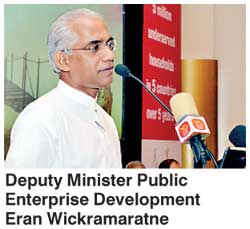Saturday Feb 21, 2026
Saturday Feb 21, 2026
Tuesday, 8 December 2015 00:38 - - {{hitsCtrl.values.hits}}
By Shehana Dain
Government intervention should only be for public interest and protectionist measures cannot be implemented for industries across the board, a top official stressed yesterday as it would harm the economy.
Public Enterprise Development Deputy Minister Eran Wickramartane noted that Government intervention for every firm and industry cannot continue in a long-term outlook in order to create economic stability.
“We need to unlock the economic potential of the country. I must stress that while the government is here to serve the people, it  realistically can’t rescue a firm or industry at every turn. In fact, Government rescue is a weak form of insurance. Politicians are not blunt enough to say that the Government cannot intervene in every firm and every industry at every turn,” he pointed out.
realistically can’t rescue a firm or industry at every turn. In fact, Government rescue is a weak form of insurance. Politicians are not blunt enough to say that the Government cannot intervene in every firm and every industry at every turn,” he pointed out.
Wickramaratne made this observation during his address at the inaugural session of the two-day ICIMF/AOA 5-5-5 Insurance Inclusive Mutual Symposium.
“In the agricultural sector, by throwing subsidies at farmers and then taking it back by increasing prices and taxes, are the farmers any stronger than they were before?” he asked.
He said that Government subsidies are a substandard form of providing insurance. However, if proper insurance schemes are technically well devised and implemented, they could provide the same functions as government subsidies but in a much more powerful form that creates more confidence.
Moreover Wickramaratne noted that such insurance will not result in secondary risk for Governments changing its promises and its budgets. The population should be uplifted in a much more sustainable and calibrated method and to create greater confidence. Therefore the greater the reach of insurance the stronger our economic institutions become.
Moreover outlining the risks faced by insurance institutions the Deputy Minister went on to say that “One longstanding, major problem in the insurance sector has been insuring against risks that affect rural communities. For example, agricultural crop insurance is difficult. Insuring farmers against fluctuations in weather or bad harvests is a serious issue. Yet there is very little of it in Sri Lanka. In another example, despite discussing labour market flexibility, we still don’t have insurance for government unemployment. These are some of the risks that people face, which ought to be insured against”.
Sri Lanka is one amongst the five countries which has been selected for the development of inclusive mutual insurance for the next five years by under the ICMIF’s (International Cooperative and Mutual Insurance Federation) AOA (Asia and Oceania Association) 5-5-5 Inclusive Mutual Insurance initiative. The project aims to reach 5 million uninsured poor households in 5 countries over 5 years.
These countries which include the Philippines, Kenya, India and Sri Lanka and one Latin American nation has been selected based on their performance and potential as emerging markets in the insurance industry.
The project has proposed to reach one million under deserved families in Sri Lanka and insure them while creating awareness.